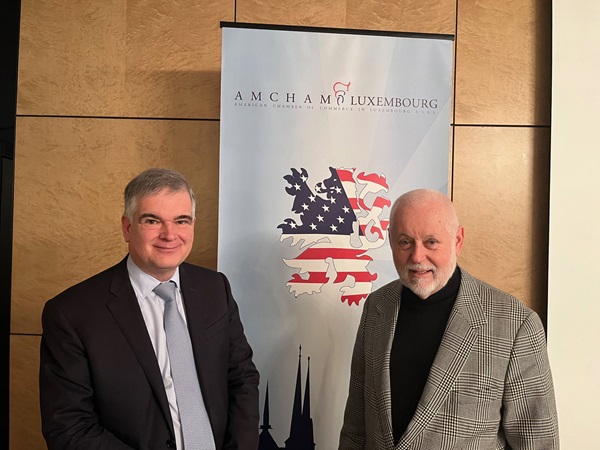 (L-R) Claude Marx (CSSF), Paul Schonenberg (AMCHAM);
Credit: Chronicle.lu
(L-R) Claude Marx (CSSF), Paul Schonenberg (AMCHAM);
Credit: Chronicle.lu
On Wednesday 6 December 2023, the American Chamber of Commerce in Luxembourg (AMCHAM) held an invitation-only Christmas Lunch at the Hotel Le Royal in Luxembourg City.
A total of 80 people attended, including both AMCHAM members and representatives of the financial world, as well as the US Ambassador to Luxembourg, Thomas Barrett.
As attendees were arriving, a networking cocktail was hosted in the venue's foyer.
Paul Schonenberg, AMCHAM Chairman, welcomed everyone and explained that it was the second year in a row for the chamber to organise such an event. He took the opportunity to introduce members of AMCHAM's Executive Committee, illustrating the strength and depth of the chamber and its activities. In this regard, he mentioned Daniel McKenzie (events), Gareth Reynolds (Treasurer), Alain Lam (Vice-Chairman), Angela Nickel (Vice-Chairman), Francis Kass (Financial Services - FinCom committee chair) and Italo di Lorenzo (Government Relations Management committee chair).
After the starter and main course, the guest speaker - Claude Marx, Director General at the Commission de Surveillance du Secteur Financier (CSSF), Luxembourg's financial regulator - addressed the room. Instead of talking about new, up-and-coming regulation, he shared a few thoughts at the year-end and what financial companies should be looking out for in the months ahead.
He confirmed that there are currently 119 banks in Luxembourg; while the number of banks is decreasing (in a period of consolidation) - down from around 200 a number of years ago - the Assets Under Management (AUM), etc., is still increasing. However, he cautioned that costs (IT, HR, etc.) are increasing.
Private banking is doing well (just under €600bn AUM), doubled over a number of years despite more regulation; there are now 14,000+ investment vehicles operating from Luxembourg.
Regarding alternatives, fund management companies are doing well: it has been quite a good year for payments, with PayPal transacting around 25% of global of their business through Luxembourg; he also referred to Amazon in the same vein.
Both banking and asset management have had good years.
He conceded that there are still challenges regarding anti-money laundering (AML) with more to be done to ensure that money here is not linked with terrorism.
On sanctions, this is a more recent topic, specifically in the aftermath of Russia invading Ukraine. He stressed that the sanctions are right and that they should be followed. He explained that more effort now goes into addressing sanctions circumvention, e.g. re-registering ships to try to avoid sanctions.
On the issue of cyber risk, he said that "we" have not so far suffered a serious cyber attack; however, he encouraged everyone to keep being vigilant; the Digital Operations Resilience Act (DORA) is required (to go live in January 2025) on risk management.
He also addressed Green Finance, referencing the regulation here being the best in the world, but also the regulation being the most complex and is here to stay. He encouraged companies to increase training and ensuring data quality; in this context, he mentioned a new labelling system to come into force.
He referenced the importance of including geopolitics in business plans as well as tracking payments, e.g. through NGOs, again referencing sanctions which can vary in different jurisdictions.
On artificial intelligence (AI), there have been quantum leaps in the last 18 months. He said that AI cannot be ignored; however, the risks should be understood. He mentioned that the US' SEC has warned of systemic risk.
On governance, he said that not all board members need to understand all such issues, but at least one person should each of the risks, with experts also contributing.
To conclude, he stressed the collaboration in Luxembourg's financial centre and referenced being invited to attend a meeting during the recent government formation tasks, to share his expertise: it is important for the government to be seen to be supporting business and finance. He also urged AMCHAM to exert its influence where possible.









